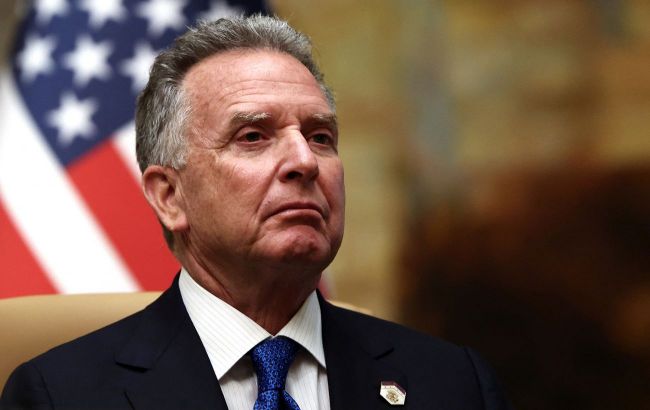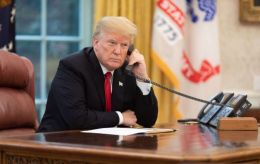Witkoff's Moscow mission, air truce and sanctions: What's at stake before Trump's deadline
 Photo: US special envoy Steve Witkoff (Getty Images)
Photo: US special envoy Steve Witkoff (Getty Images)
US special envoy Steve Witkoff arrived in Moscow a day before the deadline set by the American leader for the Kremlin. Putin is likely preparing a proposal for a "silence in the sky," while Trump is openly pressuring Russia's allies.
What is known about Witkoff's visit to Moscow, rumors about an air truce, possible US sanctions, and what preceded it – in the RBC-Ukraine report below.
Key questions:
-
Why is Witkoff’s visit to Moscow considered "Putin’s last chance"?
-
What is known about the rumors of an air truce, and why might the Kremlin agree?
-
What sanctions is the US preparing if Russia refuses a ceasefire?
-
Is Putin ready to make concessions?
-
How Trump set a deadline for the Kremlin and what’s behind his ultimatum?
Witkoff in Moscow
This morning, around 07:00 Kyiv time, reports started appearing that Trump’s special envoy’s plane landed at Moscow’s Vnukovo airport. Later, Reuters sources confirmed that Witkoff is indeed already in Moscow.
Trump’s envoy was met by Russia’s investment envoy Kirill Dmitriev.
According to sources from the news agency, Witkoff is expected to meet with the Russian leadership today.
Earlier, the Kremlin did not rule out that Russian leader Vladimir Putin might meet with Trump’s special representative.
This will be Witkoff’s fifth visit to Russia. He previously visited on February 12, March 13, April 11, and April 25.
The outcome of Witkoff’s meeting will determine whether the US will strengthen sanctions against Russia.
"We'll see what happens in a fairly short period of time. We have a meeting with Russia tomorrow (Wednesday, August 6 – ed.). We're going to see what happens.
We'll make that determination at that time," Trump said yesterday.
However, Reuters, citing sources, wrote that Putin is unlikely to agree to concessions since he is set on fully capturing four Ukrainian regions.
Western agencies, on the other hand, write that the Kremlin leader may offer an air truce (a pause in drone and missile attacks) to please Trump and avoid secondary tariffs and sanctions from the US.
According to unnamed Bloomberg sources, Witkoff’s visit to Moscow is essentially a "late opportunity for agreement with Trump even if expectations for success are low."
Notably, Donald Trump’s special representative for Ukraine, Keith Kellogg, is planning to visit Ukraine. RBC-Ukraine was informed by sources, who noted that the date of his visit has yet to be determined.
Zelenskyy spoke with Trump
It’s also notable that on the eve of Witkoff’s visit to Moscow, the presidents of Ukraine and the US had a phone call. Following the call, Zelensky reminded in his evening address that Kyiv still supports the US proposal for an immediate ceasefire.
The Ukrainian leader noted that during the war with Russia, there have been many different formats for how the killings could be stopped, and all those attempts were disrupted by the enemy.
"We spoke and proposed silence in the sky to Russia – no missile and drone strikes, no attacks on civilian infrastructure, and specifically no strikes on the energy system. All of that was violated by the Russians," Zelensky reminded.
Trump’s threats toward Russia
Trump is showing increasing frustration with the Kremlin leader and has recently intensified his rhetoric toward Moscow. At the end of July, he gave Putin a 50-day deadline to reach a deal on ending the war in Ukraine, then sharply shortened it.
As a result, August 8 marks the end of the 10-day term announced by Trump. He also stated that he is not very interested in further contacts with the Russian dictator.
The US president’s ultimatum is that by this Friday, the Kremlin must agree to a ceasefire in Ukraine, or else the US will impose additional sanctions against Moscow and secondary restrictions on countries that buy Russian oil.
Yesterday, Trump expressed the opinion that if energy prices fall low enough, Putin will “stop killing people.”
"If energy goes down enough, Putin is going to stop killing people. If you get energy down, another $10 a barrel, he's going to have no choice because his economy stinks," Trump emphasized.
What sanctions are the US preparing
The decision on what costs to impose on Russia will likely be made by Trump after the return of his special envoy from Moscow, a person close to the US president's administration told the Financial Times.
"If Witkoff comes back empty-handed, with absolutely nothing, Trump is going to go ballistic," the source told the agency.
According to journalists, the White House is specifically considering the possibility of imposing additional sanctions against Russia's shadow fleet of oil tankers if President Putin does not agree to a ceasefire in Ukraine by Friday.
At the same time, Trump himself has stated that he is considering the possibility of imposing 100-percent tariffs on Russia’s trading partners (among them China and India). However, so far he has imposed 25% duties on imported goods from India.
The reason lies in the fact that India is one of the largest importers of Russian oil. Moreover, yesterday, Trump threatened a "substantial" increase in tariffs for India.
"They are fueling the war machine. And if they’re going to do that, then I’m not going to be happy," Trump noted," Trump noted.
Moreover, let us recall that the US Senate has long been holding a bipartisan bill on sanctions against the Russian Federation.
In early April, a group of 50 American senators, led by Republican Lindsey Graham and Democrat Richard Blumenthal, introduced a legislative initiative that would impose tough restrictions in the event that the Kremlin disrupts peace negotiations regarding Ukraine.
The document provides for both primary and secondary sanctions. Among the most radical measures is the imposition of 500% tariffs on the import of Russian oil and petroleum products for those countries that continue to purchase them.
Sources: materials from Reuters, Bloomberg, Financial Times, statements by country leaders, etc.

